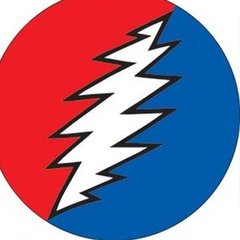-
Posts
5,384 -
Joined
-
Last visited
-
Days Won
542
Content Type
Profiles
Forums
Gallery
Events
Everything posted by Tea
-
Show is up on Archive. Went straight to Volunteers. It's a doozy ❤️❤️ https://archive.org/details/dso2024-08-27.dsoTreeHouseBrewingCo24/dso2024-08-27t23.flac
-
Lisa clearly brought down the house with volunteer - WoW! Some of these embedded reporters are at every show - not just DSO. Here's a video from DSO, now JRAD, now JGB, here's Phish, oh - I'm at a Goose show now. It's all about ways-n-means I guess......
-
Lounge Muzak in Mexico? I'll leave it to the professionals
-
Well, no Doin That Rag during the Tuesday show at the Treehouse, but darn near everything else. Wow!
-
Strikes me as odd that DSO is closing out this segment of the summer tour with a 2-night, Monday > Tuesday finish. I guess it is summer after all, but it's still interesting to me (casting zero dispersions). While you're in for a good time no matter when DSO plays, here's to an extra helping of 'squirrely' for those in attendance. I hope there are some Aces crawlin up and down their collective sleeves ⚡⚡⚡
-
Show is up - 2 sources https://archive.org/details/dso2024-08-22.168553.aud.se8.gravel.flac1648 https://archive.org/details/dso2024-08-22.DSOFrogAlleySummerStage
-
5/4/1991 Cal Expo Sacramento, CA Hell In A Bucket-> Sugaree, Minglewood Blues, Loser, The Race is On, Row Jimmy, When I Paint My Masterpiece, New Speedway Boogie-> The Music Never Stopped Victim Or The Crime-> Crazy Fingers-> Playin' In The Band-> Uncle John's Band-> Drums-> Jam-> I Need A Miracle-> Standing On the Moon-> One More Saturday Night, E: Touch Of Gray F: Piece of my Heart
-
4/7/1985 The Spectrum Philadelphia, PA Why Don't We Do It In The Road-> Mississippi Half Step-> CC Rider, Bird Song, Dancin' In The Streets, Deal Shakedown Street-> Samson & Delilah, She Belongs To Me-> Women Are Smarter-> Drums-> Gimme Some Lovin'-> Truckin'-> Smokestack Lightning-> Morning Dew-> Sugar Magnolia E: Day Job F: White Rabbit
-
Thank you for being YOU! 💓
- 1 reply
-
- 2
-

-

-
Elective (unconfirmed) Cold Rain and Snow Beat It on Down the Line Dupree's Diamond Blues We Can Run Peggy-O When I Paint My Masterpiece Liberty Pride of Cucamonga Alabama Getaway Greatest Story Ever Told Help is on the Way > Slipknot! > Feel Like a Stranger > Stir it Up > Franklins Tower > Drums > Space > Low Spark of High-Heeled Boys > Corrina > I Shall Be Released > Satisfaction E: Oh! Darling
-
Presale is now live! 🌹🎟️🌹 Score advance tickets to our Fall Tour & Cosmic New Year's Eve shows today thru 10 PM ET on Thurs. 8/22. Use password 'SHAKEDOWN' to unlock tickets in advance of the public on sale Friday at 10 AM ET. https://www.darkstarorchestra.net/tour/
-
Dark
-
3/14/1971 Camp Randall Field House - University Of Wisconsin Madison, WI Truckin', Me and My Uncle, It Hurts Me Too, Bertha, Me And Bobby McGee, Hard To Handle, Loser, Good Lovin' Casey Jones, Sugar Magnolia, Wharf Rat, Greatest Story Ever Told > Johnny B. Goode, Uncle John's Band F: Cumberland Blues ; Big Railroad Blues ; Next Time You See Me ; I Second That Emotion ; Bye and Bye ; Going Down The Road Feeling Bad* Notes: Dino on Drums * Rob Koritz on drums for GDTRFB
-
5/1/1977 The Palladium New York, NY Might As Well, El Paso, Ramble On Rose, Cassidy, They Love Each Other, Lazy Lightning-> Supplication, It Must Have Been The Roses, Estimated Prophet, Tennessee Jed, Sunrise, Samson & Delilah Dancin' In The Streets-> Brown Eyed Women, Beer Barrel Polka-> Playin' In The Band-> Drums-> The Other One-> Comes A Time-> Playing in the Band E: Brokedown Palace F: The Way Tou Do The Things You Do, Woodstock* *Debut
-
Original Recipe (unconfirmed) Minglewood Blues Sittin on Top of The World Little Red Rooster Althea Broken Arrow Chimes of Freedom New Speedway Boogie Easy to Slip Tangled Up in Blue China Cat Sunflower > Hey Pocky Way > I Know You Rider, Corina > St Stephen > Drums > Imagine Space > Terrapin Station > St Stephen Reprise > Johnny B Goode E: Love the One You’re With E: Sisters and Brothers
-
Winterland Arena 1974-10-19 San Francisco, CA Mississippi Half Step, Me & My Uncle, Friend Of The Devil, Beat It On Down The Line, It Must Have Been The Roses, El Paso, Loose Lucy, Black Throated Wind, Scarlet Begonias, To Lay Me Down, Mama Tried, Eyes Of The World-> China Doll, Big River Phil & Ned ? Uncle John's Band, Big Railroad Blues, The Race is On, Tomorrow Is Forever, Mexicali Blues, Dire Wolf, Sugar Magnolia-> He's Gone-> Truckin'-> Caution (Do Not Stop on Tracks) Jam-> Drums-> Truckin'-> Black Peter, Sunshine Daydream E: One More Saturday Night E: U.S. Blues
-
Now it’s confirmed Jack Straw ; Brown Eyed Women ; Mister Charlie ; Green, Green Grass of Home ; Don't Ease Me In ; Big Boss Man ; Box Of Rain ; Strange Man ; Dark Hollow ; They Love Each Other ; New Orleans > Good Lovin' Here Comes Sunshine ; Cumberland Blues ; It Hurts Me Too ; In The Midnight Hour ; Unbroken Chain > Dark Star > drums > Dark Star jam > Morning Dew > Not Fade Away > Going Down The Road Feeling Bad > Caution (Do Not Stop On Tracks) Encore: Rockin' Pneumonia And The Boogie Woogie Flu Notes: Dino on drums. Rob K drums on encore.
-
I wonder if it was Chimes of Freedom - would fit the arc of that list pretty well
-
Here's what I could piece together (still unconfirmed) Jack Straw Brown-Eyed Women Mr. Charlie Don't Ease Me In Big Boss Man Box of Rain They Love Each Other Good Lovin > Drums > Good Lovin Here Comes Sunshine Cumberland Blues It Hurts Me Too In The Midnight Hour Unbroken Chain > Dark Star > Morning Dew > Not Fade Away > GDTRFB > Not Fade Away E: Rockin' Pneumonia and the Boogie Woogie Flu Notes: Get Barraco a throat lozenge after that slate
-
Looks like it's a 71-72 inspired elective. Only have an unconfirmed partial list so far....
-
I don't know- anyone? From the internet sleuthing I've done while supposed to be working, I'm going to guess 1973 or elective. Let see how far off I am....
-
Barraco with RatDog from Feb of 2003
-
1976-07-12 Orpheum Theatre San Francisco, CA Music Never Stopped > Brown Eyed Women, Cassidy, Tennessee Jed, Minglewood Blues, Candyman, Looks Like Rain, Row Jimmy, Lazy Lightning > Supplication, Deal, Promised Land Sugaree, Samson & Delilah, Help On The Way-> Slipknot!-> Franklin's Tower-> Dancin' In The Streets-> Wharf Rat-> Drums-> The Wheel-> Around & Around, E: U.S. Blues
-
Elective - although just a couple substituted songs* in the 1st set from original show: World Music Theater on 1990-07-21 Set 1: Touch Of Grey > Greatest Story Ever Told ; Jack-a-Roe ; My Brother Esau* ; Friend Of The Devil ; I Just Want To Make Love To You* ; Queen Jane Approximately ; Bird Song Set 2: Scarlet Begonias > Fire On The Mountain ; Playing In The Band > He's Gone > drums > space > I Need A Miracle > Crazy Fingers > Playing In The Band reprise > One More Saturday Night Encore: Quinn the Eskimo (The Mighty Quinn)



